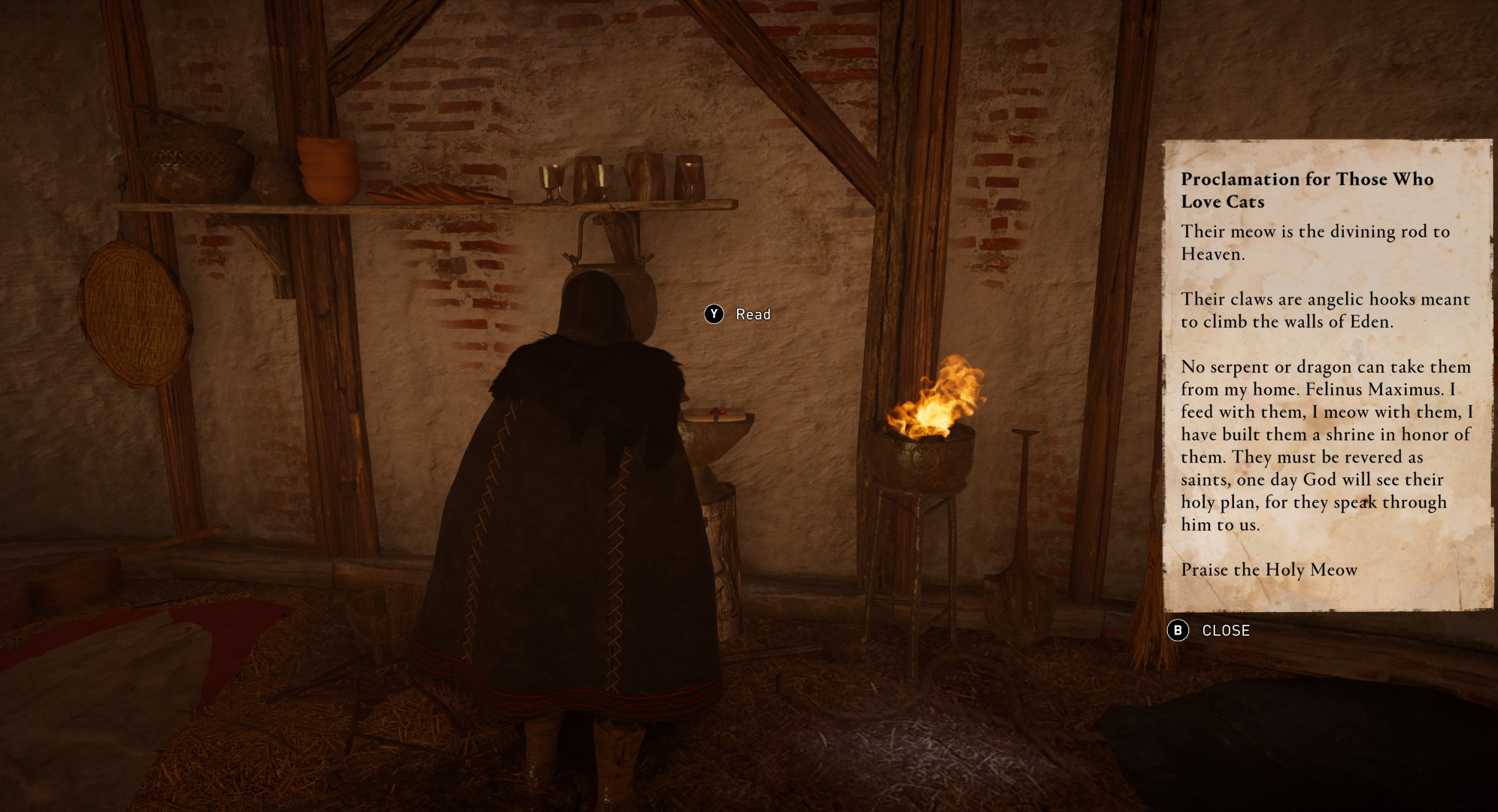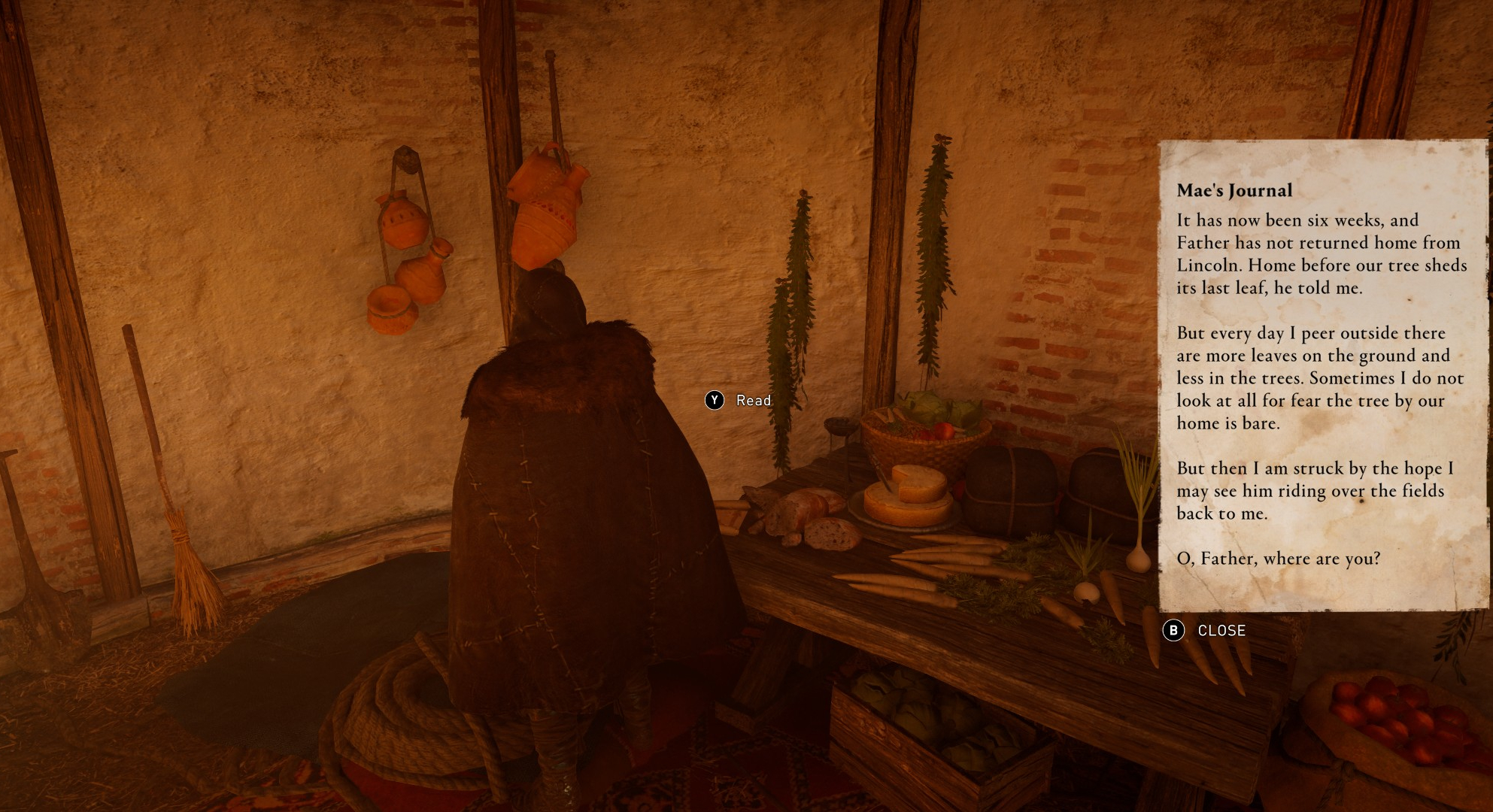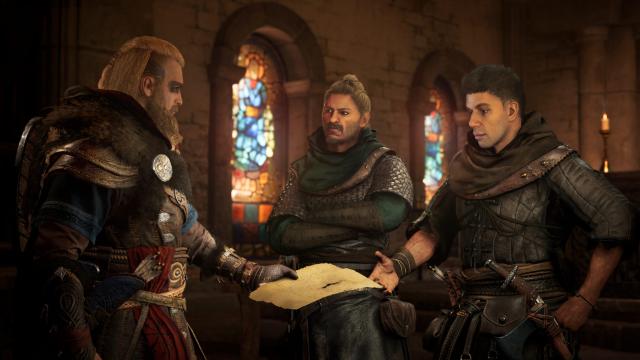As granite-hewn Viking woman Eivor, I’ve done a lot of things in Assassin’s Creed Valhalla: I’ve run across boundless landscapes. I’ve raided more churches than I can count. I’ve stabbed guys and thrown their bodies at other guys, who I’ve then proceeded to stab, thus beginning anew a process I like to call The Circle Of Guys. But I’ve also done a formidable amount of reading, which has surprised me, seeing as the vast majority of Vikings could not read.
Like a great many other modern video games, Assassin’s Creed Valhalla frequently dispenses scraps of story through literal scraps of paper. A random note in somebody’s house might communicate their true feelings, their darkest secrets, or how much they love cats (spoiler: too much). Sometimes this text just adds flavour to the world. Other times, notes function as crucial links in longer quest chains. In any case, they’re everywhere. Eivor reads them and internalizes their contents, occasionally remarking out loud about what she’s learned.
I hate it! Though early Vikings made runic inscriptions, their societies were not literate in the traditional sense. Instead, they had a rich oral tradition, which Valhalla does at least pay homage to through storytelling during naval voyages, flyting (rhyming battles of wits that increase your charisma stat), and Eivor’s general knack for poetry. This is not to say that Vikings didn’t keep records. They were a smart, sophisticated people, as opposed to the variant on the “noble savage” trope we get in many pieces of media these days. But skalds — court poets, basically — mostly did their record keeping orally, through lengthy, possibly fictionalized poems describing the accomplishments of kings and other heroic figures.

It wasn’t until Vikings converted to Christianity around the 11th century that writing became more common (Valhalla takes place in the 9th century, near the beginning of the Viking Age). Most writing about Vikings prior to that period came from the perspectives of those who dealt with Vikings, whether through diplomacy and politics or that whole “raiding” thing Vikings liked to do. The latter led to another interesting phenomenon: Many early writings about Vikings came from clergymen (one of the few groups of people in England who could semi-reliably read and write at the time) who were pissed off that Vikings had ransacked their churches.
All of which is to say: It’s highly unlikely that somebody like Eivor would know how to read or write. And even if they did, there’s basically zero chance they’d have run around the countryside reading notes from random English peasants who, against all odds, were also somehow literate.
I know what you’re thinking: “Wow dude, you want historical accuracy from the series that features magic apples and the lost city of Atlantis as central plot points? Shut the fuck up!” I know you’re thinking that because I’m also thinking that. If ever there was a time I would like for myself to shut the fuck up, it’s now. But I can’t. My brain won’t stop registering this complaint every time I come across a note in the game.
Given everything else the Assassin’s Creed series contains — genetic time travel, rideable wolves, an ancient race called the “Isu” that created humanity — literacy is an objectively dumb breaking point. On top of that, I used to hate Realism Guys. There is simply no good reason to be opposed to, for example, Black people in fantasy settings inspired by portions of medieval Europe (that, in all likelihood, were not bereft of Black people), women in positions of power, or LGBTQ+ people existing. Never mind that, again, these people almost certainly did exist in the real places that inspired these fictional settings; the bigger issue is that it’s all fantasy. If you can have dragons or, heck, main characters who speak perfect English and don’t die the moment a sword skewers their guts, you can have whatever you want. But now, suddenly, I’m a Realism Guy. I’ve become that which I despise. I look in the mirror, and I want to stab the guy I see and throw him at a bunch of other guys.
But Assassin’s Creed is still a series that leans hard into recreating historical settings down to very specific details. I enjoy those details and think that, in this particular instance, they could lead to more interesting stories than the ones Valhalla is telling. Don’t get me wrong: I love Axehead. But every quirky vignette along those lines is followed by several humdrum notes in which a character describes Their Whole Thing in a painfully on-the-nose fashion. At that point, they are not people; they’re just packaging intended to keep all the content from growing stale.
What if, instead of reading notes, Eivor surveyed environments and came to her own conclusions, ala The Witcher III and — sometimes, but not often enough — Assassin’s Creed Valhalla? What if communication between in-game characters wasn’t just a series of perfect English conversations between people with slightly different accents? What if quests leaned more into the minutiae of Viking life — surviving, physically constructing settlements, devising tactics — rather than fast-forwarding through it all to get to mindless raids and bog-standard Assassin’s Creed missions? Or heck, what if the game’s focus was entirely different? What if instead of a warrior, you were a skald? What if poetry and storytelling were your main means of interacting with the world, rather than violence? But then, since this would still be an Assassin’s Creed game, you could also use your unassuming role as a means of getting close to assassination targets? I think that would be a neat game.

But these ideas do not fit the Assassin’s Creed mould, which has increasingly come to prioritise content over substance. That’s not to say that there isn’t any substance — just that it’s spread out, with ample filler between rare slabs of authentic intrigue. The way the game keeps you constantly moving through lightweight activities without forcing you to open your map is actually pretty ingenious, but it does mean that everything blurs together after a while. It also necessitates a whole, whole lot of content to sustain such a gargantuan world. The game’s structure is an expression of this. Houses and buildings are slight variations on each other, or straight up copies. Mini-stories are frequently conveyed through notes, rather than bespoke environments or creating NPCs for each quest among thousands. That, then, is how we wind up with a world in which early Vikings and English peasants are hyperliterate; there just isn’t really another option — at least, not for Assassin’s Creed as it exists now.
It does make me wonder what a game more tailored to a historical version of this setting would look like. But it also makes me wonder if I’d play that game, since it probably wouldn’t be called Assassin’s Creed. I began Valhalla because I wanted comfort food. I got what I expected. But as with other Assassin’s Creed games, I find myself hungering for just a bit more after each bite. For now, though, I guess if I want a historical fix, I’ll just stick to books.
Recommended Stories
[referenced id=”1194513″ url=”https://www.kotaku.com.au/2020/11/rip-to-assassins-creeds-best-npc-a-real-one/” thumb=”https://www.gizmodo.com.au/wp-content/uploads/sites/3/2020/11/24/mgom7ns9l30dkcnmrtbh-300×172.jpg” title=”RIP To Assassin’s Creed’s Best NPC, A Real One” excerpt=”In gargantuan games full of quests and characters, it’s hard for any single moment to really stand out. Ubisoft has made a career out of this, with activity-dotted landscapes that lull you into a sort of dreamy adventure haze; when you come to, you know that something happened, but you’d…”]
[referenced id=”1192930″ url=”https://www.kotaku.com.au/2020/11/no-i-wont-ride-the-big-wolf-in-assassins-creed-valhalla/” thumb=”https://www.gizmodo.com.au/wp-content/uploads/sites/3/2020/11/13/yua7gkku76xq0glwru6b-300×169.png” title=”No, I Won’t Ride The Big Wolf In Assassin’s Creed Valhalla” excerpt=”Assassin’s Creed Valhalla, released earlier this week, has some wild, strange, and magical elements in it. But while it might contain witches and impossible future technology, I draw the line at a specific inclusion. I won’t ride the giant wolf, Ubisoft. I won’t do it.”]
[referenced id=”1192447″ url=”https://www.kotaku.com.au/2020/11/i-really-like-assassins-creed-valhallas-easily-readable-lore-screens/” thumb=”https://www.gizmodo.com.au/wp-content/uploads/sites/3/2020/11/11/ltqszcsek9lac04aqb04-300×169.png” title=”I Really Like Assassin’s Creed Valhalla’s Easily Readable Lore Screens” excerpt=”I like a lot of things about Assassin’s Creed Valhalla. I like the setting. I like the new quest system. I like the changes to the loot system that frees my character from hauling dozens of the same sword. What’s also great? I can read the game’s lore text from…”]

Leave a Reply